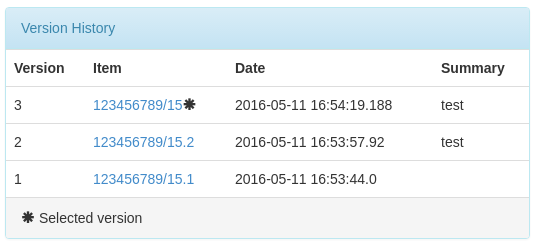Page History
...
Persistent Identifiers are used to address Items within DSpace. The handle system is deeply integrated within DSpace, but since version 4 DSpace 4 DOIs are supported as wellcan also mint DOIs. DSpace 4 and 5 supported one type of versioned handle: The initial version of an Item got a handle, e.g. 10673/100. This handle was called the canonical one. When a newer version was created, this the canonical handle was moved to identify the newest version. The previously newest version and the older got the same handle attached with an an got a new handle builded out of the canonical handle extended by a dot and the version number. In the image below you see a version history of an item using this handle strategy. The idea behind this strategy is to use the Item Level Versioning to track metadata changes. Nevertheless you should manually ensure, that page numbers in Bitstreams are preserved to not invalidate any citations using the handle and a page number. The handle 10673/100 is called canonical handle as it is the handle canonically used by all versions of this item.
<include screenshot>
With DSpace 6.0 a new handle strategy was implemented and the default configuration from DSpace was changed to use this new strategy.
Beginning with version 6.0 DSpace supports two
The canonical handle will always point to the newest version of an Item. This makes sense if you hide the version history. Normal users won't be able to find older versions and will always see just the newest one. Please keep in mind, that older versions can be accessed by "guessing" the versioned Handle if you do not remove the read policies manually. The downside of this identifier strategy is that there is no permanent handle to cite the currently newest version, as it will get a new Handle when a newer version is created.
With DSpace 6 versioned DOIs (using DataCite as DOI registration agency) were added and the default versioned Handle strategy was changed. Starting with DSpace 6 the VersionedHandleIdentifierProvider creates a handle for the first version of an item. Every newer version gets the same handle extended by a dot and the version number. To stay by the example from above, the first version of an Item gets the Handle 10673/100, the second version 10673/100.2, the third version 10673.3 and so on. This strategy has the downside that there is no handle pointing always to the newest version. But each version gets an identifier that can be use to cite exactly this version. If page numbers changes in newer editions the old citations stay valid. This strategy makes sense especially if you present the version history to all users. In the image below you see a version history using this strategy.
In DSpace 4 and 5 only the strategy using canoical handles (one handle that always points to the newest version) were implemented. In DSpace 6 the strategy of creating a new handle for each version was implemented. With DSpace 6 this new strategy become the default. The strategy using canonical handle still exists in DSpace but you have to change the configuration if you want to use it. With DSpace 6 versioned DOIs were introduced using the strategy that every new version gets a new DOI (extended by a dot and the version numbers for versions >= 2).
You can configure which persistent identifiers should be used by editing You can override the default behaviour of the Identifier Service using following XML configuration file, deployed under your dspace installation directory:
...
No changes to this file are required to enable Versioning. This file is currently only relevant if you aim to develop your own implementation of versioningwant to keep the identifier strategy from DSpace 4 and 5 or if you want to enable DOIs or even versioned DOIs.
Version History Visibility
...

